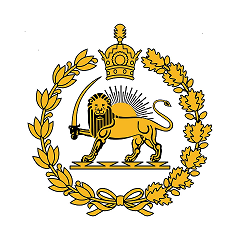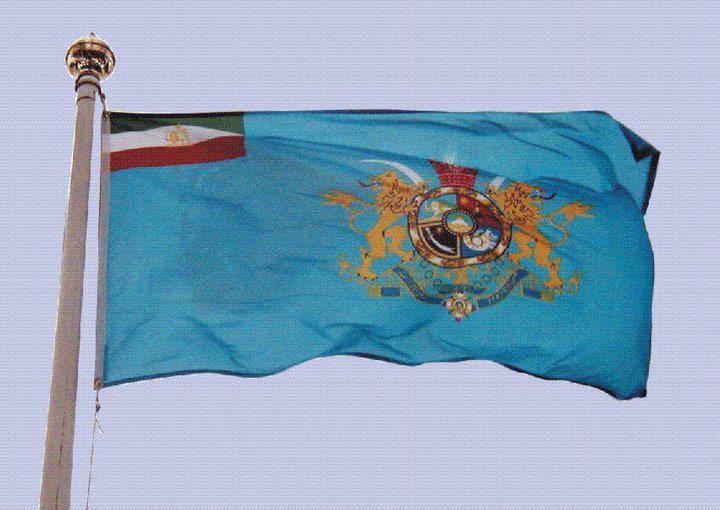
 | International House of Mashruteh |

ART. 35. The sovereignty is a trust confided as a Divine gift by the people to the person of the King.
ART. 36. The constitutional Monarchy of Persia is given by Majlis Moasesan to his Imperial Majesty Reza Shah Pahlavi and his male descendants, generation after generation.
ART. 37. The Crown Prince will be the eldest son of the King whose mother is of Iranian origin. In case the King should have no male children, the apointment of the crown prince will be made according to the King's proposal and the approval of the Majlis Shora Melli, provided that the Crown Prince is not from the Qajar family but whenever a son is born he will be the crown prince.
ART. 38. At the time of the transfer of the Crown the Crown Prince can take charge of the affairs of the kingdom when he has attained the age of twenty solar years. If he has not reached this age, Shahbanou, the mother of the Crown Prince, will immediately the affairs of the monarchy, unless an other person has been appointed by the King as regent. The regent will form a council consisting of the prime minister, the speaker of the senate, speaker of the Majlis Shora Melli, chairman of the suprime court, and four of the countries most insightful and trusted individuals, and shall perdorm the duties of the monarch in accordance with the constitution in consultation with that council, until such time as the Crown Prince shall attain this age. In the event of the death or resignation of the regent the council will temporaly perform the duties of the regent until the appointment of the regent by the Senate and Majlis Shora Melli, other then the Qajar family.
ART. 39. No King can ascend the Throne unless, before his coronation, he appears before the National Consultative Assembly, in presence of the Members of this Assembly and of the Senate, and of the Cabinet of Ministers, and repeat the following oath:
"I take to witness the Almighty and Most High God, on the glorious Word of God, and by all that is most honored in God's sight, and do hereby swear that I will exert all my efforts to preserve the independence of Iran, safeguard and protect the frontiers of my Kingdom and the rights of my People, observe the Fundamental Laws of the Mashruteh Constitution of Iran, rule in accordance with the established laws of Sovereignty, endeavor to promote the Ja'farí doctrine of the Twelve Imáms, and will in all my deeds and actions consider God Most Glorious as present and watching me. I have no purpose other then the greatness and glory of the government and mellat of Iran, and I further ask aid from God, from Whom alone aid is derived, and seek help from the good spirits of the Saints of Islám to render service to the advancement of Iran."
ART. 40. So in like manner no one who is chosen as Regent can enter upon his functions unless and until he repeats the above oath.
ART. 41. In the event of the King's decease Article 38 will be followed. In this case as well as in the case of the transfer of the throne, if the regent is not selected in the manner described in the above mentioned principle the Majlis Shora Melli and the Senate must of necessity meet, and will elect a regent outside the Qajar family, and until the election of the regent, a delegation consisting of the prime ministers, and speakers of Majlis Shora Melli and Senate, and the head of the suprime court, and three of the former prime ministers, or former speakers of Majlis or Senate elected by the cabinet will be temporaly in charge of regent. The regent who is selected according the Articles 41 and 38 must take the oath in accordance with Article 39. Whoever reaches the position of the regent is forbidden of reaching the position of the King.
ART. 42. In any case where the regent is elected by Senate and Majlis Shora Melli the convening of a joined meeting of the deputies of either or both of the Assemblies shall not posponed for more then ten days. If the term of the dputies of both Majlis Shora Melli and Senate or one of them
have expired, and the new deputies shall not yet have been elected, the deputies of the late Parliament shall reassemble, and the two Assemblies shall be reconstituted. In case of dissolution of one or both Majlis until the formation of a new Senate of Majlis Shora Melli and the election of the regent the affairs of the regent will be temporarily the responsibility of the said board in article 41. The King can select a council to administer the affairs of the kingdom during his travel and in his absence, or appoint a regent who will be advised by the said council temporarily for the duration of King's travel and in his absence.
ART. 43. The King cannot, without the consent and approval of the Majlis Shora Melli and the Senate, undertake the government of any other country.
ART. 44. The person of the King is exempted from responsibility. The Ministers of State are responsible to both Chambers in all matters.
ART. 45. The decrees and rescripts of the King relating to affairs of State can only be carried out when they are countersigned by the responsible Minister, who is also responsible for the authenticity of such decree or rescript.
ART. 46. The appointment and dismissal of Ministers is effected by virtue of the Royal Decree of the King.
ART. 47. The granting of military rank, decorations and other honorary distinctions shall be effected with due regard to the special law referring to the person of the King.
ART. 48. The choice of officials as heads of the various government departments, whether internal or foreign, subject to the approval of the responsible Minister, is the King's right, save in such cases as are specifically excepted by the Law; but the appointment of other officials does not lie with the King, save in such cases as are explicitly specified for by the Law.
ART. 49. The issue of decrees and orders for giving effect to the laws is the King's right, provided that under no circumstances shall he postpone or suspend the implementation of such laws. The laws on the country's finances, which are the prerogative of the Majlis Shora Melli, are refered to the Majlis Shora Melli, if the King deems it necessary. His majesty the King will sign the law, if three quarters of the deputies are present in Tehran and approve the former opinion of Majlis.
ART. 50. The supreme command of all the forces, military and naval, is vested in the person of the King.
ART. 51. The declaration of war and the conclusion of peace are vested in the King.
ART. 52. The treaties which, conformably to article 24 of the Fundamental Law promulgated on Dhu'l-Qa'da 14, A.H. 1324 [December 30, 1906], must remain secret, shall be communicated by the King, with the necessary explanations, to the National Consultative Assembly and the Senate after the disappearance of the reasons which necessitated such secrecy, as soon as the public interests and security shall require it.
ART. 53. The secret clauses of a treaty cannot in any case annul the public clauses of the same.
ART. 54. The King can convoke in extraordinary session the National Consultative Assembly and the Senate.
ART. 55. The minting of coin, subject to conformity with the Law, is in the name of the King.
ART. 56. The expenses and disbursements of the Court shall be determined by law.
ART. 57. The Royal prerogatives and powers are only those explicitly mentioned in the present law of Mashrutiat.